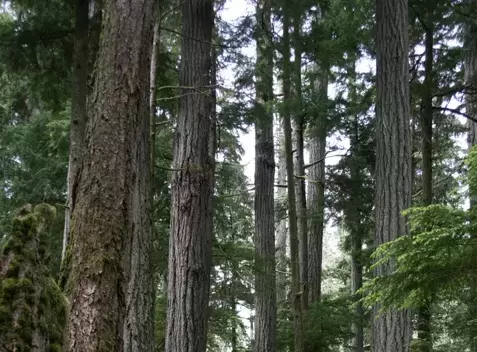An offer from the Ministry of Forest, Lands and Natural Resources that will compensate Tseshaht First Nation for private lands removed from Tree Farm License 44 has been ratified by membership at a meeting held Nov. 9.
The value of the offer is about $10 million, said Chief Councillor Les Sam.
The agreement includes forest tenure opportunities, including a woodlot at Ship Creek of 376 ha with an annual allowable cut (AAC) of 3,592m3, a First Nations Woodland License around Sproat Lake with an AAC of 26,000m3 per year, and a First Nations Woodland License at Cataract of 1,519 ha. There is also tourism opportunities set out in the agreement, including a possible campground development on Sproat Lake.
Tseshaht becomes one of the first nations to be offered a First Nations Woodland license. They are long-term licenses of 25 years, and are renewable if the nation demonstrates good management of the lands.
Membership poured over the offer and held a lengthy discussion about the impact it would have on band-owned business revenues. A small minority of Tseshaht suggested the agreement should go to a referendum, but the majority didn’t want the offer put at risk by any delay, said Tseshaht Chief Operating Officer Cindy Stern.
Sam and Stern delivered the news of the community’s ratification of the offer to the provincial government on Nov. 10 and received word that the signing of the agreement would follow soon.
Sam said it is a very future-forward agreement that will change the way the lands would be managed over the long-term, and allows for a multi-use approach to the territory, including providing areas for cultural and spiritual practices.
Sam said he was very excited that the situation around Tree Farm License 44 had been resolved. He first raised the issue in 2004 with then forestry minister Mike deJong.
Tree management licenses have been part of the forestry industry since the late 1940s. Companies were given cutting rights to Crown land, and in return the companies were required to include their adjacent private lands in the tenure area and manage those lands to the standards set for the tenured land.
The 1-million hectare Tree Farm License 44 was granted to MacMillan Bloedel in 1955. The tenure included more than 70,000 hectares in private lands. Prior to the tree farm license being sold in 2005, the provincial government agreed to remove the private lands from the license, effectively removing the trees from provincial regulation.
The decision to remove the private lands was made without consulting Tseshaht or Hupacasath, nations that have title interest in the territory. This set the parties on a six-year journey through the courts and mediated negotiation for compensation and accommodation.
Mediation began in September 2009 with a team made up of Sam, Stern, Darrell Ross, Robert Hunter and Willard Gallic.
In the agreement, the province acknowledges the lack of adequate consultation with Tseshaht before the private lands were removed from the tree farm license. This lack of consultation is contrary to the Supreme Court of Canada Haida decision, which found that when a proposed development could infringe on the rights and title of a First Nation, that nation must be meaningfully consulted about the project or initiative. If the project goes forward, the nations must then be adequately compensated and/or accommodated for any impact on those rights and title.
Stern said the resulting accommodation in the case of Tree Farm License 44 provides Tseshaht a very good opportunity, because if the lands are managed well, the 25-year term for the First Nations Woodland Licenses is renewable, so the agreement could be extended well into the future.
Tseshaht is very well prepared for the opportunity that the agreement offers. It has made a very good business for itself in the forestry sector, and will be able to expand its capacity with more jobs for community members and opportunities for spin-off business ventures. Forestry currently employs Tseshaht members, and the operations include an engineering arm for road and infrastructure development.
Sam said the community will have to prepare the children on how to be good forest managers. It’s an agreement that will benefit them and those yet born over many years to come.







